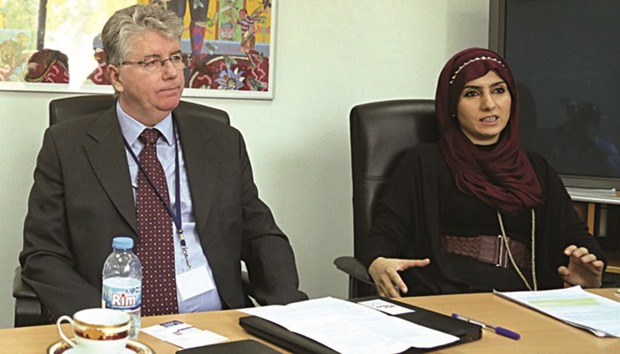UK and Gulf-based researchers and scientists will have the opportunity to get a £400,000 grant from the UK government to research on ‘priority areas’ it identified, British Council and embassy officials announced yesterday.
The fund will be used for the British Council’s top profile programme, ‘Institutional Links,’ aimed at supporting research and innovation capacity building in the partner institution.
“We are trying to tackle global issues and by far the most pressing issues are water, energy, food production and cyber security,” Dr Malak Hamdan, head of Science and Innovation Network (Gulf) at the British embassy, said in Doha yesterday.
The programme is looking for one applicant from the UK and another applicant from a “maximum of two partner countries in the Gulf,” according to the British Council on its website, adding that applications can be bilateral (UK-Gulf country) or trilateral (UK-Gulf country-Gulf country).
A first-of-its-kind in the Gulf, Dr Hamdan said they are encouraging as many researchers in the region to bid into the programme, which also aims to strengthen partnerships with Gulf countries and to help tackle the challenges they share.
Citing that Qatar is doing “incredibly well” in terms of its research landscape, she said UK scientists will also have the opportunity to collaborate and engage with scientists in the country, especially those at Qatar Foundation and Qatar University.
Designed to establish links beyond the level of the individual researcher and innovation practitioner, the programme is opening up “opportunities for more sustainable, solution-oriented collaborations between academic groups as well as with the private and third sector such as small and medium enterprises, non-governmental organisations, technology transfer offices and other not-for-profit organisations.
“Based on the number of people interested, and the quality of application, it could open the doors in the future for further funding,” the embassy official noted.
Individuals who want to be part of the programme should be affiliated with universities or research institutes. Deadline is on October 7.
Dr Hamdan also stressed the importance of including cyber security as part of the ‘priority areas,’ a pressing issue that has a broad spectrum: from data protection to the social sciences.
British Council country director Dr Frank Fitzpatrick echoed her statements saying they conducted a series of symposia and workshops across the Gulf last year to explore research themes (priority areas). It was attended by more than 15 universities and institutions from the UK.
British Council also partnered with the Qatar National Research Fund in a joint funding programme for workshops in health and information, communication and technology, sustainable materials and entrepreneurship, he noted.
“This year, the Institutional Links programme aims to build on that with some concrete funding for research amounting to almost £3mn from the UK govt for countries in the Gulf,” Dr Fitzpatrick said.
“Apart from that, we will be offering some training programmes for schools and universities and for young researchers in developing the ability to communicate in science,” he added. “The idea is to generate interest among young people in science.”
More information is available in the guidelines document in the downloads section of the British Council website (https://www.britishcouncil.org)

Dr Frank Fitzpatrick and Dr Malak Hamdan during their address in Doha yesterday.
